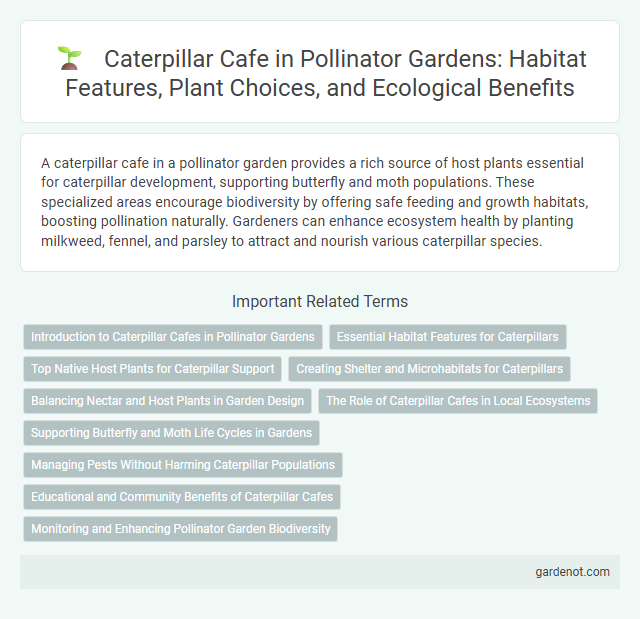A caterpillar cafe in a pollinator garden provides a rich source of host plants essential for caterpillar development, supporting butterfly and moth populations. These specialized areas encourage biodiversity by offering safe feeding and growth habitats, boosting pollination naturally. Gardeners can enhance ecosystem health by planting milkweed, fennel, and parsley to attract and nourish various caterpillar species.
Introduction to Caterpillar Cafes in Pollinator Gardens
Caterpillar cafes in pollinator gardens provide essential host plants that support various caterpillar species during their larval stage. These specialized garden areas offer diverse native foliage, ensuring a sustainable food source for caterpillars, which are crucial for the development of butterflies and moths. Establishing caterpillar cafes enhances pollinator biodiversity and promotes ecological balance within garden ecosystems.
Essential Habitat Features for Caterpillars
Caterpillar cafes require abundant host plants such as milkweed, parsley, and violets to provide essential nourishment for larvae development. Ample native flowering plants support a diverse ecosystem, ensuring continuous food sources and shelter throughout caterpillar life stages. Maintaining undisturbed leaf litter and twig piles offers critical microhabitats for pupation and protection against predators.
Top Native Host Plants for Caterpillar Support
Top native host plants for caterpillar support include milkweed, goldenrod, and wild cherry, providing essential nourishment for various butterfly and moth larvae. These plants create a thriving habitat that sustains caterpillar development and promotes pollinator diversity in a pollinator garden. Incorporating diverse native species ensures a robust food source and supports local ecosystems.
Creating Shelter and Microhabitats for Caterpillars
Caterpillar cafes provide essential shelter and microhabitats by incorporating native plants, leaf litter, and host vegetation that caterpillars rely on for food and protection. These microhabitats create a safe environment that supports various developmental stages, enhancing survival rates and promoting biodiversity. Strategic placement of shrubs and perennial plants fosters humidity and temperature regulation, vital for caterpillar growth.
Balancing Nectar and Host Plants in Garden Design
Balancing nectar and host plants in a caterpillar cafe is essential to support diverse pollinator species throughout their life cycles. Incorporating native nectar-rich flowers alongside specific host plants like milkweed for monarchs ensures continuous food sources from larva to adult butterfly stages. This strategic planting promotes pollinator health and biodiversity, creating a thriving ecosystem within the garden design.
The Role of Caterpillar Cafes in Local Ecosystems
Caterpillar cafes serve as vital habitats within pollinator gardens, offering essential food sources and shelter for various caterpillar species. These specialized areas support biodiversity by providing native plants that caterpillars depend on, which in turn sustain local butterfly and moth populations. Maintaining caterpillar cafes enhances ecological balance and promotes pollination through the life cycles of these insects.
Supporting Butterfly and Moth Life Cycles in Gardens
Caterpillar cafes provide essential host plants that support the complete life cycles of butterflies and moths, ensuring larvae have nutritious foliage for growth and metamorphosis. Incorporating native plant species such as milkweed, dill, and fennel creates ideal habitats for various caterpillar species, promoting biodiversity within pollinator gardens. Maintaining pesticide-free zones enhances caterpillar survival rates, fostering a healthy environment for butterfly and moth populations to thrive.
Managing Pests Without Harming Caterpillar Populations
In a pollinator garden, managing pests without harming caterpillar populations requires targeted strategies like handpicking harmful insects and using organic treatments such as neem oil or insecticidal soap. Introducing beneficial predators, such as ladybugs and parasitic wasps, helps control pest populations naturally while preserving caterpillars critical for butterfly and moth development. Maintaining native host plants ensures a healthy habitat for caterpillars to feed and thrive, supporting biodiversity within the pollinator garden ecosystem.
Educational and Community Benefits of Caterpillar Cafes
Caterpillar cafes provide an interactive educational platform where community members learn about insect life cycles, pollinator roles, and biodiversity conservation. These cafes foster environmental awareness and stewardship by engaging schools, families, and local groups in hands-on gardening and monitoring activities. Establishing caterpillar cafes strengthens community bonds while promoting pollinator-friendly habitats essential for sustainable ecosystems.
Monitoring and Enhancing Pollinator Garden Biodiversity
Caterpillar cafes serve as vital habitats within pollinator gardens, providing essential host plants that support the lifecycle of various butterfly and moth species. Regular monitoring of caterpillar populations helps identify plant preferences and detect imbalances in biodiversity, enabling targeted interventions such as planting native flora and reducing pesticide use. Enhancing these microhabitats promotes a diverse pollinator community, contributing to ecosystem resilience and improved pollination services in the garden.
Caterpillar café Infographic

 gardenot.com
gardenot.com